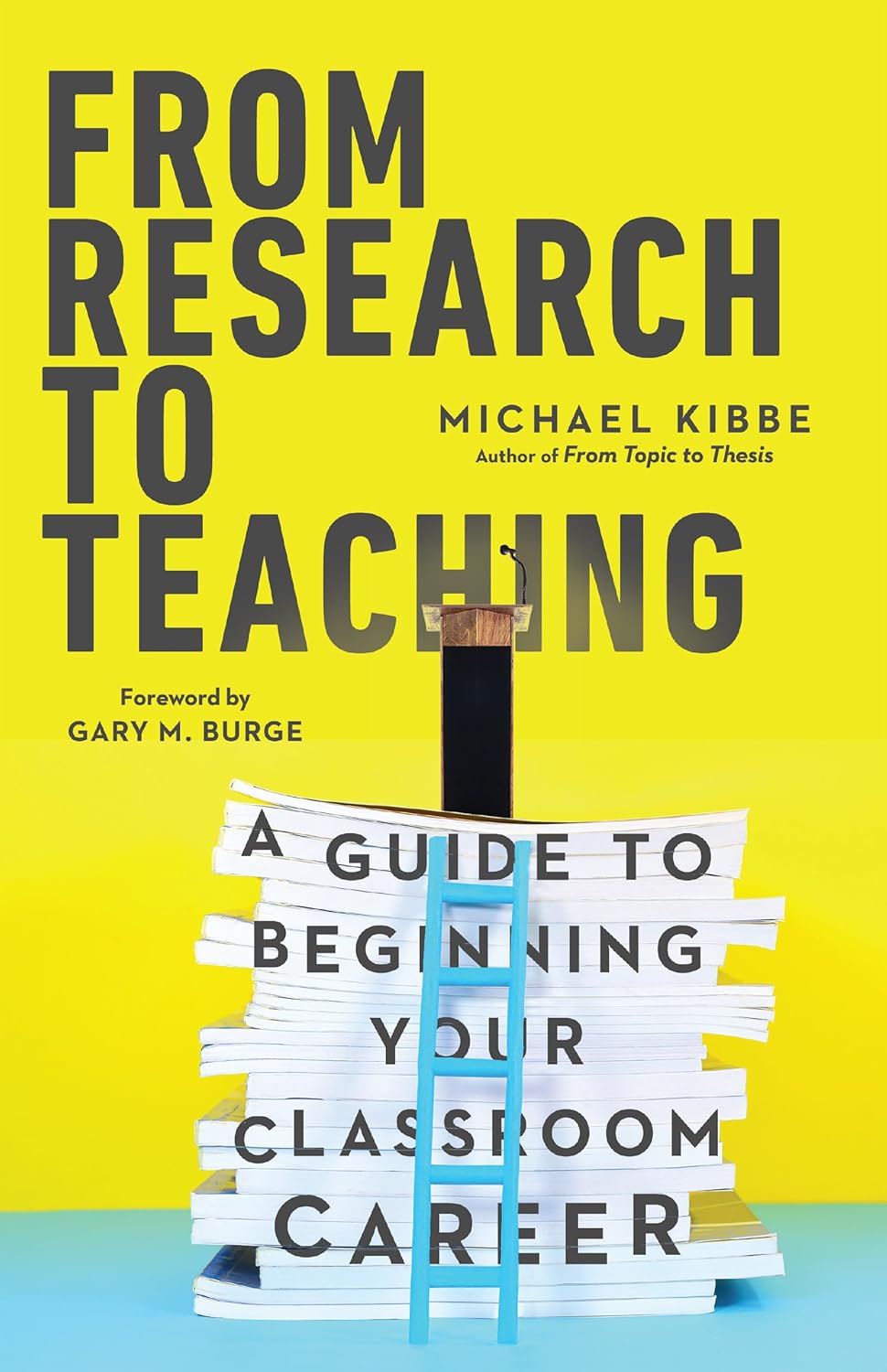A Book Review from Books At a Glance
by Ryan M. McGraw
Though it may surprise some readers, this is one of the best and most momentous books this reviewer has read in recent years. Don’t let the title mislead you. While targeting those finishing doctoral work and preparing to teach in the classroom, Michael Kibbe’s solid counsel has potential to affect and redirect most of what we do. Teaching is part of daily life. In addition to those who teach for a living, most people teach, whether a homeschool mom, a dad leading family worship, an older sibling helping a younger one with homework, someone training a new hire at work, Sunday school teachers, and ministers. Yet whether teaching is our job or we are teaching in more informal settings, most people have one thing in common: we teach without anyone teaching us how to teach. Michael Kibbe’s judicious sequel to his earlier book on research (From Topic to Thesis) here gives sage advice to anyone engaged in teaching, encouraging them to be willing to make mistakes and to keep getting better at what they do. Regardless of the level of teaching we do, this book is full of common-sense wisdom applicable by analogy to how we live and what we do in almost anything.
Kibbe’s immediate target is graduate students wrapping up PhD projects and preparing to take their first teaching posts. One primary contention of the book, especially reflected in appendix B, is that most graduate schools excel in training students to do research, but fail to train them how to write, teach, and communicate well generally. This creates a problem since most such people immediately begin teaching careers without training in teaching. In two parts and seven chapters, Kibbe leads bewildered graduates by the hand through what teachers must do and what they must know. They must prepare for teaching, execute the task itself, and find time to reflect and evaluate their teaching to learn to teach better. Regarding knowledge, they must know the mission and method of their institution, the community in which they work, their own limitations, and the potential power and influence of their teaching. One recurring theme marking the entire book is humility and the willingness to risk making lots of mistakes to grow in teaching ability. Fear of failure, resulting in unwillingness to change and develop, is the real reason why many people fail at what they do (e.g., 47-57, 75). Moreover, rather than merely reading boring academic papers at conferences, and focusing on delivering content to students, teachers should become “fanatical” in doing research on how to teach better (15). Including everything from seeking mentors (20-30), to reading good books (15-20), to securing time for reflection, to taking regular “sabbaths” from research and teaching (75-79), to keeping institutional goals in mind, to avoiding abusing social media (116-120), and many other judicious comments, this book is gripping, compelling, and life-changing.
Though most people teach in some capacity, and Kibbe’s target audience is teachers proper, his counsel seems particularly relevant to pastors (see pg. 109). Effectively, pastors do prayerful “research” every week in preparing sermons and Bible studies. Yet once seminary and internships are over, it is all too easy for preachers to “find their voices” and become too comfortable with their preaching styles and levels of effectiveness. Sadly, few pastors solicit or receive constructive criticism on their preaching and teaching, aside from receiving personal attacks from those who are mad at the time. Kibbe’s material illustrates the advantages of full-time teachers, including pastors, finding ways to keep developing and expanding their gifts, finding avenues for realistic self-evaluation, mentorship, good reading, and peer review. The fact that preaching depends ultimately on the Holy Spirit’s work both in preachers and in hearers can lead us to forget that we also improve and expand gifts through use and by constructive criticism. Pastors teaching church history in Sunday school should learn from skilled grade school teachers and homeschool parents, for example, how to make their topics interesting, and preachers have something to learn about engaging an audience from people in their churches who do this well in other contexts. Every Christian needs the body of Christ, everyone learns through making mistakes, and no one is doing their job as well as they can, including ministers and elders. We need more of the Spirit’s power glorifying Christ in people’s hearts in our churches, but we also need teachers who are always becoming better teachers. Never forget that even Jesus in his humanity not only grew in age and godliness with experience, but in wisdom (Lk. 2:52). If Christ learned wisdom through experience, without wrestling with the burdens of sin in his heart, then how much more should we seek to prevent our pride from getting in the way of becoming wiser and better teachers in the church as well as in schools and homes. Particularly, Kibbe’s judicious comments about the blessings and challenges of having flexible schedules while needing to fix self-imposed limitations (116) and prioritizing our families (99-104) are just as relevant to pastors as it is to academics.
I wish I had this book, both before entering the ministry and teaching at a seminary. Regardless of the capacity in which you teach, you will quickly be hooked by this short and compelling book. I cannot commend it highly enough. It is worth both reading and revisiting regularly.
Ryan M. McGraw
Greenville Presbyterian Theological Seminary
